Honor our first president—and celebrate Presidents Day—with these inspirational George Washington quotes

85 Famous George Washington Quotes in Honor of Presidents Day

Mark your calendar: Presidents Day falls on Feb. 17 this year, and though it’s a few days earlier than George Washington’s birthday, it also commemorates the birth of America’s first president. (In case you’re curious, his actual birthday was Feb. 22.) This is the perfect time to honor the wisdom, leadership and lasting legacy of our Founding Fathers. And what better way to celebrate than by diving into some of the most powerful George Washington quotes?
Presidents Day doesn’t just honor the contributions of past U.S. presidents. It also serves as a time to reflect on the fascinating history and unique stories of leaders like Jimmy Carter, George Bush, Joe Biden and, of course, Washington himself.
George Washington’s quotes continue to inspire us with timeless lessons about character, life and governance. Whether you’re looking for motivation or simply want to learn more about his philosophy, his quotes offer wisdom we can all apply to our daily lives.
So take a moment to explore George Washington’s famous quotes—and let them inspire you to be a strong, thoughtful and impactful leader every day.
Get Reader’s Digest’s Read Up newsletter for more quotes, holiday facts, humor, cleaning, travel and tech all week long.
Famous George Washington quotes
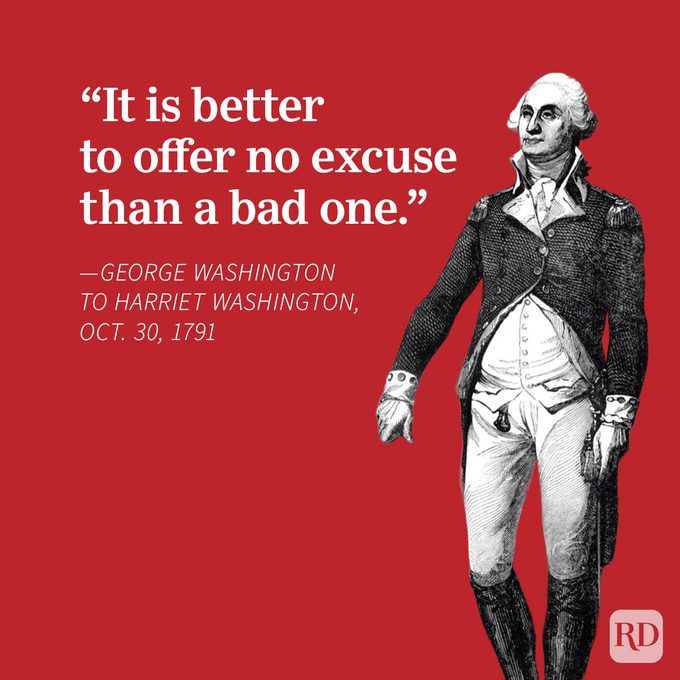
1. “It is better to offer no excuse than a bad one.” —To Harriet Washington, Oct. 30, 1791
2. “If freedom of speech is taken away, then dumb and silent we may be led, like sheep to the slaughter.” —Newburgh Address, March 15, 1783
3. “Paper money has had the effect in your state that it ever will have, to ruin commerce, oppress the honest and open the door to every species of fraud and injustice.” —Letter to Thomas Jefferson, Aug. 1, 1786
4. “But lest some unlucky event should happen unfavorable to my reputation, I beg it may be remembered by every gentleman in the room that I this day declare with the utmost sincerity, I do not think myself equal to the command I am honored with.” —Address to the Continental Congress, June 16, 1775
5. “Having now finished the work assigned me, I retire from the great theater of action.” —Address to Congress to resign his commission, Dec. 23, 1783
6. “The ways of Providence being inscrutable, and the justice of it not to be scanned by the shallow eye of humanity, nor to be counteracted by the utmost efforts of human power or wisdom, resignation, and as far as the strength of our reason and religion can carry us, a cheerful acquiescence to the Divine Will, is what we are to aim.” —Letter to Colonel Bassett, April 20, 1773
7. “To be prepared for war is one of the most effectual means of preserving peace.” —First annual address to both houses of Congress, Jan. 8, 1790
8. “I hope I shall possess firmness and virtue enough to maintain what I consider the most enviable of all titles, the character of an honest man.” —To Alexander Hamilton, Aug. 28, 1788
9. “Guard against the impostures of pretended patriotism.” —Farewell address, Sept. 19, 1796
10. “Interwoven as is the love of liberty with every ligament of your hearts, no recommendation of mine is necessary to fortify or confirm the attachment.” —Farewell address, Sept. 19, 1796
11. “There can be no greater error than to expect, or calculate upon real favors from nation to nation.” —Farewell address, Sept. 19, 1796
12. “I shall make it the most agreeable part of my duty to study merit, and reward the brave and deserving.” —Address to the officers of the Virginia regiment, Jan. 8, 1756
13. “Towards the preservation of your government and the permanency of your present happy state, it is requisite not only that you steadily discountenance irregular oppositions to its acknowledged authority but also that you resist with care the spirit of innovation upon its principles, however specious the pretexts.” —Farewell address, Sept. 19, 1796
14. “Of all the dispositions and habits which lead to political prosperity, religion and morality are indispensable supports.” —Farewell address, Sept. 19, 1796
15. “Gentlemen, you will permit me to put on my spectacles, for, I have grown not only gray, but almost blind in the service of my country.” —Quoted during a response to the Newburgh Address, March 15, 1783
Motivational George Washington quotes
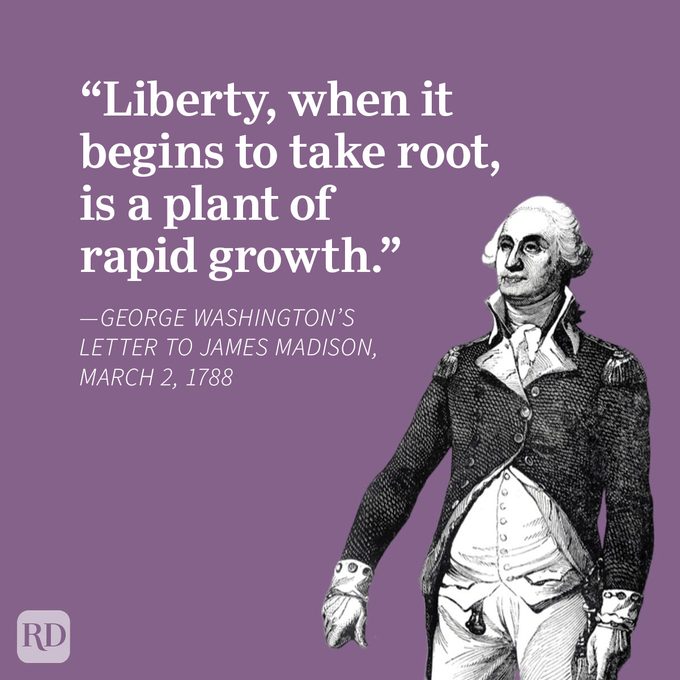
16. “Liberty, when it begins to take root, is a plant of rapid growth.”
17. “Let your heart feel for the afflictions and distress of everyone, and let your hand give in proportion to your purse.”
18. “There is a destiny which has the control of our actions, not to be resisted by the strongest efforts of human nature.”
19. “The harder the conflict, the greater the triumph.”
20. “A man’s intentions should be allowed in some respects to plead for his actions.”
21. “We must consult our means rather than our wishes.”
22. “Be courteous to all, but intimate with few; and let those be well-tried before you give them your confidence.”
23. “Worry is the interest paid by those who borrow trouble.”
24. “True friendship is a plant of slow growth, and must undergo and withstand the shocks of adversity, before it is entitled to the appellation.”
25. “Real men despise battle, but will never run from it.”
26. “To persevere in one’s duty, and be silent is the best answer to calumny.”
27. “We should not look back unless it is to derive useful lessons from past errors, and for the purpose of profiting by dearly bought experience.”
28. “Let your conversation be without malice or envy, for it is a sign of a tractable and commendable nature; and in all cases of passion admit reason to govern.”
29. “There is nothing which can better deserve your patronage, than the promotion of science and literature.”
30. “Bad seed is a robbery of the worst kind: for your pocket-book not only suffers by it, but your preparations are lost and a season passes away unimproved.”
31. “Experience teaches us that it is much easier to prevent an enemy from posting themselves than it is to dislodge them after they have got possession.”
George Washington quotes about government
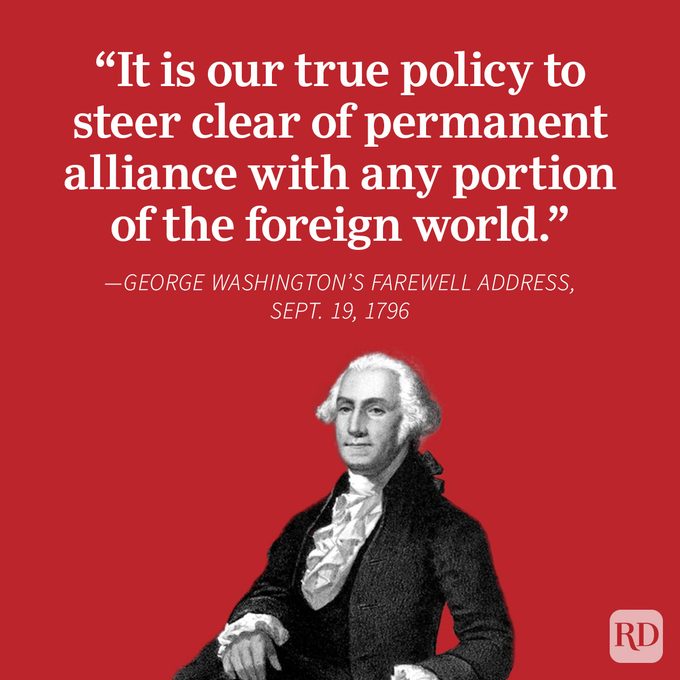
32. “Respect for its authority, compliance with its laws, acquiescence in its measures, are duties enjoined by the fundamental maxims of true liberty.”
33. “The very idea of the power and the right of the people to establish government presupposes the duty of every individual to obey the established government.”
34. “To the efficacy and permanency of your Union, a government for the whole is indispensable. No alliances, however strict, between the parts can be an adequate substitute. They must inevitably experience the infractions and interruptions which all alliances in all times have experienced.”
35. “While we are contending for our own liberty, we should be very cautious not to violate the rights of conscience in others, ever considering that God alone is the judge of the hearts of men, and to him only in this case they are answerable.”
36. “Arbitrary power is most easily established on the ruins of liberty abused to licentiousness.”
37. “I have diligently sought the public welfare; and have endeavoured to inculcate the same principles in all that are under me. These reflections will be a cordial to my mind as long as I am able to distinguish between good and evil.”
38. “The time is near at hand which must determine whether Americans are to be free men or slaves.”
39. “The name of American, which belongs to you in your national capacity, must always exalt the just pride of patriotism more than any appellation derived from local discriminations.”
40. “With slight shades of difference, you have the same religion, manners, habits and political principles. You have in a common cause fought and triumphed together.”
41. “The independence and liberty you possess are the work of joint councils and joint efforts—of common dangers, sufferings and successes.”
42. “The basis of our political systems is the right of the people to make and to alter their constitutions of government. But the Constitution which at any time exists, until changed by an explicit and authentic act of the whole people, is sacredly obligatory upon all.”
43. “For happily the government of the United States, which gives to bigotry no sanction—to persecution no assistance, requires only that they who live under its protection should demean themselves as good citizens.”
44. “You cannot shield yourselves too much against the jealousies and heart burnings which spring from these misrepresentations. They tend to render alien to each other those who ought to be bound together by fraternal affection.”
45. “It is our true policy to steer clear of permanent alliance with any portion of the foreign world.”
46. “Is there a doubt whether a common government can embrace so large a sphere? Let experience solve it. To listen to mere speculation in such a case were criminal.”
47. “We are authorized to hope that a proper organization of the whole, with the auxiliary agency of governments for the respective subdivisions, will afford a happy issue to the experiment.”
48. “To anticipate and prevent disastrous contingencies would be the part of wisdom and patriotism.”
49. “Mankind, when left to themselves, are unfit for their own government.”
50. “One of the expedients of party to acquire influence, within particular districts, is to misrepresent the opinions and aims of other districts.”
George Washington quotes about character
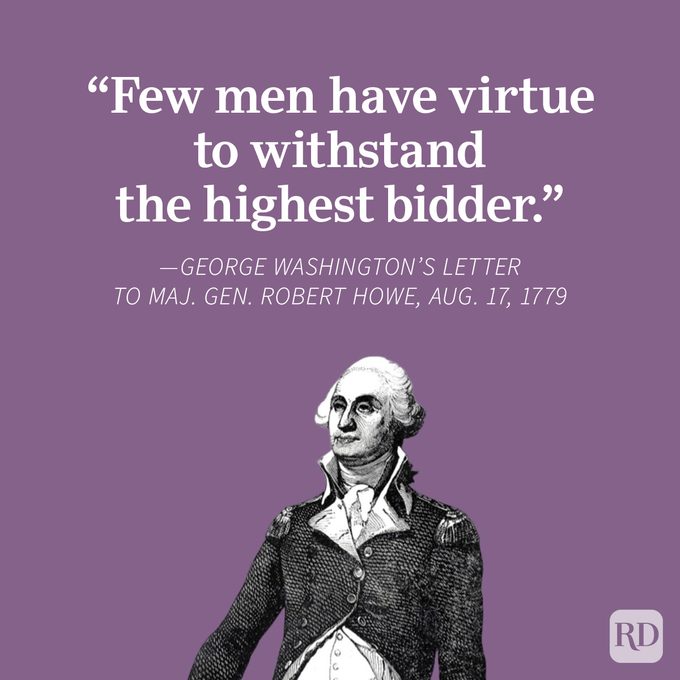
51. “Few men have virtue to withstand the highest bidder.”
52. “It is infinitely better to have a few good Men, than many indifferent ones.”
53. “The Constitution is the guide which I never will abandon.”
54. “Associate with men of good quality if you esteem your own reputation; for it is better to be alone than in bad company.”
55. “For it is fixed principle with me, that whatever is done should be done well.”
56. “I hold the maxim no less applicable to public than to private affairs, that honesty is always the best policy.”
57. “I shall not be deprived … of a comfort in the worst event, if I retain a consciousness of having acted to the best of my judgment.”
58. “Remember that it is the actions, and not the commission, that make the officer, and that there is more expected from him than the title.”
59. “Whatever may be conceded to the influence of refined education on minds of peculiar structure, reason and experience both forbid us to expect that national morality can prevail in exclusion of religious principle.”
60. “Nothing is a greater stranger to my breast, or a sin that my soul more abhors, than that black and detestable one, ingratitude.”
61. “A good moral character is the first essential in a man. … It is therefore highly important that you should endeavor not only to be learned but virtuous.”
62. “Discipline is the soul of an army. It makes small numbers formidable; procures success to the weak and esteem to all.”
63. “A people unused to restraint must be led. They will not be drove.”
64. “A person who is anxious to be a leader of the fashion, or one of the first to follow it, will certainly appear in the eyes of judicious men to have nothing better than a frequent change of dress to recommend him to notice.”
65. “Who that is a sincere friend to it can look with indifference upon attempts to shake the foundation of the fabric?”
George Washington quotes about life
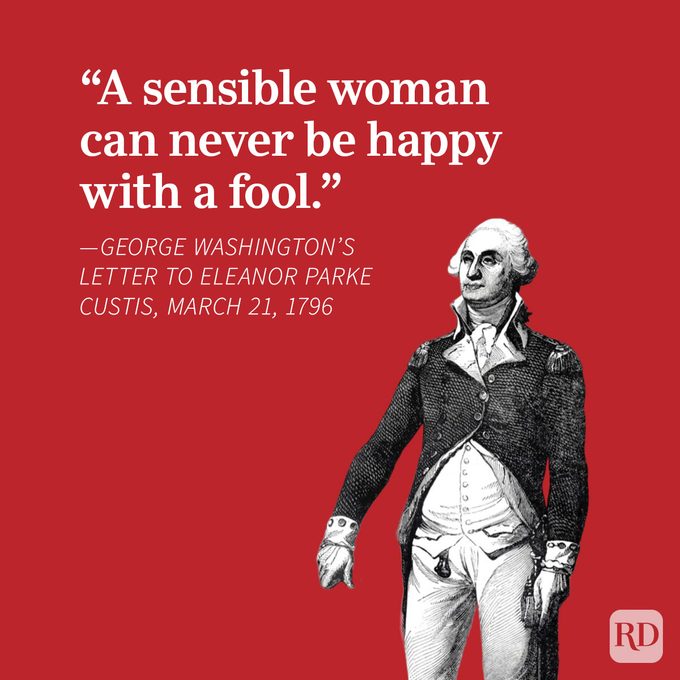
66. “For although we cannot avoid first impressions, we may assuredly place them under guard.”
67. “Observe good faith and justice towards all nations; cultivate peace and harmony with all; religion and morality enjoin this conduct, and can it be that good policy does not equally enjoin it?”
68. “Flirting is hardly a degree removed from the latter and both are punished by the counter game of men, who see this the case and act accordingly.”
69. “The foolish and wicked practice of profane cursing and swearing is a vice so mean and low that every person of sense and character detests and despises it.”
70. “With me, a predominant motive has been to endeavor to gain time for our country to settle and mature its yet recent institutions and to progress without interruption to that degree of strength and consistency which is necessary to give it, humanly speaking, the command of its own fortunes.”




















